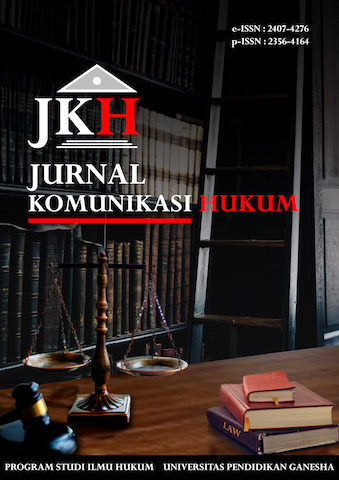LEGAL PROTECTION FOR WORKERS THAT HAVE BEEN TERMINATED DURING THE COVID-19 PANDEMIC
DOI:
https://doi.org/10.23887/jkh.v8i2.52142Abstract
This study aims to determine legal protection for workers who experience layoffs during the covid-19 pandemic. In this study, the type of research used is normative legal research using legal material collection techniques in the form of document studies or literature studies. The approach used in this research is a statutory approach and the sources of legal materials used are primary legal materials, secondary materials, and tertiary legal materials. The results of the study indicate that Termination of Employment has a negative impact on workers because they lose their jobs so that it also has an impact on increasing the poverty level of the Indonesian people. Due to the emergence of PSBB regulations from the government, of course, the space for work is getting narrower and layoffs are increasingly happening, therefore the regulation of Law no. 13 of 2003 concerning Manpower and also the role of the government is very important to overcome the occurrence of layoffs that are not in accordance with the laws and regulations.
Downloads
Published
How to Cite
Issue
Section
License
Authors who publish with this journal agree to the following terms:- Authors retain copyright and grant the journal right of first publication with the work simultaneously licensed under a Creative Commons Attribution License that allows others to share the work with an acknowledgement of the work's authorship and initial publication in this journal.
- Authors are able to enter into separate, additional contractual arrangements for the non-exclusive distribution of the journal's published version of the work (e.g., post it to an institutional repository or publish it in a book), with an acknowledgement of its initial publication in this journal.
- Authors are permitted and encouraged to post their work online (e.g., in institutional repositories or on their website) prior to and during the submission process, as it can lead to productive exchanges, as well as earlier and greater citation of published work (See The Effect of Open Access).
Authors who publish with this journal agree to the following terms:
- Authors retain copyright and grant the journal right of first publication, with the work [SPECIFY PERIOD OF TIME] after publication simultaneously licensed under aCreative Commons Attribution License that allows others to share the work with an acknowledgement of the work's authorship and initial publication in this journal.
- Authors are able to enter into separate, additional contractual arrangements for the non-exclusive distribution of the journal's published version of the work (e.g., post it to an institutional repository or publish it in a book), with an acknowledgement of its initial publication in this journal.
- Authors are permitted and encouraged to post their work online (e.g., in institutional repositories or on their website) prior to and during the submission process, as it can lead to productive exchanges, as well as earlier and greater citation of published work (See The Effect of Open Access).












